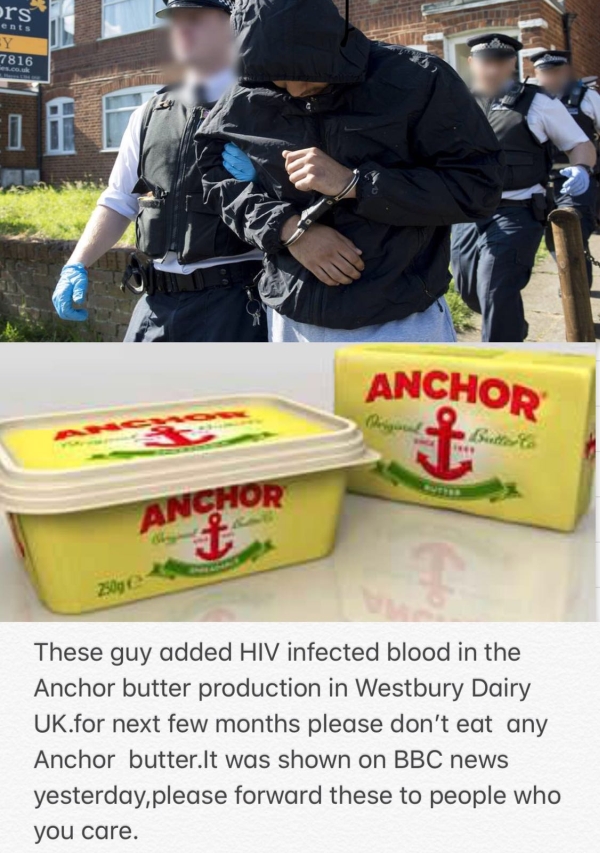Mere days after an identical rumor targeted the U.K.-based confectionery company Cadbury in February 2018, a flurry of social media posts spread the claim that a worker at a U.K. dairy "added HIV infected blood in the Anchor Butter production":
The name of the dairy where Anchor Butter is produced in England is actually Westbury Dairies, located in Wiltshire. A representative of Westbury's parent company, Arla Foods UK, confirmed to us by email that the rumor is false.
"Please be assured this is a hoax in very poor taste," the company's consumer relations department said.
Unsurprisingly, a search of the BBC News web site turned up no articles or videos reporting that butter or any other dairy product in the U.K. was contaminated with HIV-infected blood, or that anyone was arrested by police for doing such a thing. Using a reverse-image search, we determined that the image used in the Anchor Butter meme was lifted either from a 2015 article about crime in London or an earlier (2014) article in the Evening Standard about Scotland Yard conducting police raids across London.
Both the Anchor Butter and Cadbury memes were unoriginal updates of an internet hoax dating back several years. Among the other food and beverage items falsely alleged to have been contaminated with the virus that causes AIDS are pineapples, oranges, bananas, canned goods, and soft drinks, including Pepsi-Cola
This is the guys who added his infected blood to Pepsi :)#Copied pic.twitter.com/4rf5m2a5XR
— RKJockies (@rkjhaw) December 18, 2017
Because the specter of AIDS (acquired immune deficiency syndrome), scares people, the rumor continues to mutate and thrive despite the extreme unlikelihood of HIV (human immunodeficiency virus) being transmitted in such a manner. According to the Centers for Disease Control (CDC), the virus cannot survive long outside a human host and only under the rarest circumstances has been passed from person to person via food:
You can’t get HIV from consuming food handled by an HIV-infected person. Even if the food contained small amounts of HIV-infected blood or semen, exposure to the air, heat from cooking, and stomach acid would destroy the virus.
Though it is very rare, HIV can be spread by eating food that has been pre-chewed by an HIV-infected person. The contamination occurs when infected blood from a caregiver’s mouth mixes with food while chewing. The only known cases are among infants.


